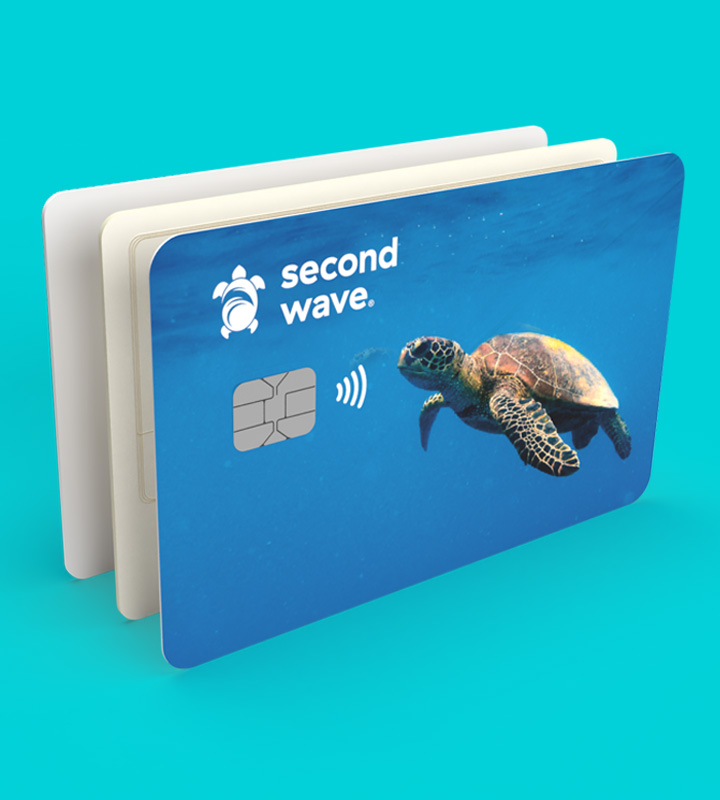

Offer your cardholders beautifully designed payment cards featuring a core made with post-consumer plastic waste that has been diverted from entering the world’s oceans, waterways and shorelines.
Focused on transforming plastic debris into products, CPI seamlessly integrates upcycled recovered ocean-bound plastic into the core of a high quality card that is compliant with EMVCo standards and dual interface capable.
Introduce a new program or design that embodies your sustainability commitments and captures cardholder attention, or incorporate this product into your existing designs. We can help to convert your existing design to accommodate the upcycled materials.
93%
of respondents say they are “concerned” about plastic waste in the oceans
85%
of respondents find a card made with recovered ocean plastic “appealing”
81%
of respondents would switch to a recovered ocean plastic card if it were offered by their current issuer
54%
of respondents would switch to a different issuer if they were to offer a recovered ocean plastic card (with the same features and benefits on their current card)
CPI consumer insights fielded November 2022 n2100
Recovered Ocean-Bound Plastic is typically recovered within 50 kilometers of a seashore, or near streams and rivers that lead to the ocean, in countries or regions that lack adequate waste management infrastructure. CPI considers this plastic to be a subset of Recovered Ocean Plastic, which also includes plastic debris that is collected directly from the ocean.
![]()
Discarded plastic bottles, bags and containers pollute and damage fragile coastal and oceanic ecosystems.
![]()
Plastic can live in the ocean for hundreds of years, even longer for small particles.
![]()
If there is no change in waste habits, plastic is expected to outweigh fish in the ocean by 2050.
![]()
The estimated amount of waste that enters the ocean annually is equivalent to dumping the contents of one garbage truck into the ocean per minute. The plastic remains whole or is smashed into particles, entangling animals or is mistaken as food by wildlife. The waste contaminates seawater and damages fragile coral reef systems.

The First Mile®, an initiative of Thread International and WORK, formalizes waste collection networks in low-income communities and bridges the gap for global brands to purchase from these responsible supply chains, while diverting plastic waste from our oceans and landfills.

NextWave Plastics is a collaborative and open-source initiative convening leading multinational companies to develop the first global network of ocean-bound plastic supply chains. Simply put, NextWave keeps plastic in the economy and out of the ocean.
Connect with a sales representative for a quote or schedule a demonstration.
Check order status or connect with a representative for assistance with a product.

©2023 CPI Card Group Inc. All Rights Reserved
Card@Once is a registered trademark of CPI Card Group Inc.: U.S. Patent No.: 8429075 and 10,275,747 and multiple patents outside of the United States.
Encased metal products and production technology are protected by the following patents of CPI Card Group Inc.: U.S. 8,857,722, 9,117,155, 9,430,724, 9,779,343; 10,032,099; 10,255,536; 10,445,628, 10,824,926; 11,301,735 Canada 2,879,639, 3,073,852; UK GB2519046; Japan 6777836; Korea 10-2208865
Ultrasecure card package is protected by U.S. Patent Nos.: 10,625,915, 9,049,909, 11,267,628 and 11,034,497
EMV® is a registered trademark in the U.S. and other countries and an unregistered trademark elsewhere. The EMV trademark is owned by EMVCo, LLC. The Contactless Indicator mark, consisting of four graduating arcs, is a trademark owned by and used with permission of EMVCo, LLC.
We use cookies on our website to give you the most relevant experience by remembering your preferences and repeat visits. By clicking “Accept”, you consent to the use of ALL the cookies.